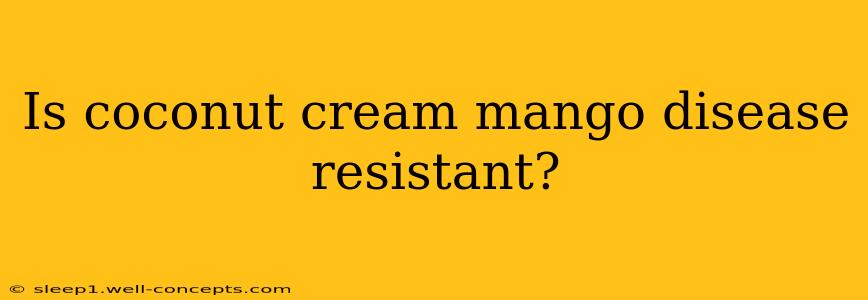Is Coconut Cream Mango Disease Resistant? A Deep Dive into Mango Health
The question of whether coconut cream application affects mango disease resistance is a complex one, lacking definitive scientific consensus. While anecdotal evidence and some traditional practices suggest potential benefits, robust research confirming its effectiveness against specific diseases is currently limited. This article explores the current understanding of mango diseases, common control methods, and the potential role of coconut cream in plant health.
Understanding Mango Diseases
Mango trees, while resilient, are susceptible to a variety of fungal, bacterial, and viral diseases. These diseases can significantly impact fruit yield, quality, and the overall health of the tree. Some of the most common and devastating diseases include:
-
Anthracnose (Colletotrichum gloeosporioides): This fungal disease affects all parts of the mango tree, causing lesions on leaves, flowers, and fruits. It can lead to significant fruit rot and economic losses.
-
Mango Malformation: This disease, caused by a fungus (Fusarium spp.), causes abnormal growth of vegetative buds, resulting in distorted flowers and fruits.
-
Powdery Mildew (Oidium mangiferae): This fungal disease forms a white powdery coating on leaves, flowers, and fruits, hindering photosynthesis and affecting fruit development.
-
Bacterial Canker (Xanthomonas campestris pv. mangiferaeindicae): This bacterial disease causes dark lesions on leaves, twigs, and fruits, eventually leading to canker development.
Conventional Disease Management Strategies
Farmers typically employ a combination of strategies to manage mango diseases, including:
-
Sanitation: Removing and destroying infected plant material prevents the spread of pathogens.
-
Fungicides and Bactericides: Chemical treatments offer effective control of many diseases, although overuse can lead to environmental concerns and the development of resistant pathogens.
-
Resistant Cultivars: Planting disease-resistant mango varieties is a crucial long-term strategy for disease management.
-
Proper Orchard Management: Practices like appropriate spacing, pruning, and irrigation contribute to a healthier tree, making it less susceptible to disease.
Coconut Cream and Plant Health: A Closer Look
The application of coconut cream to mango trees, primarily as a foliar spray, is often mentioned in folk remedies and among some growers. The rationale behind its use stems from the belief that the cream's fatty acids and other components might strengthen plant cell walls, improve nutrient uptake, or provide some level of antifungal or antibacterial properties. However, this is not backed by extensive scientific research.
What the Research Shows (or Doesn't Show)
Currently, there's a significant lack of peer-reviewed scientific studies directly investigating the effectiveness of coconut cream in preventing or controlling mango diseases. While coconut products contain beneficial compounds, their efficacy in protecting mango trees from specific pathogens remains largely unproven. More research is needed to establish any conclusive link between coconut cream application and increased disease resistance in mango trees.
Conclusion
While the use of coconut cream on mango trees is an intriguing area worthy of further investigation, there's currently insufficient scientific evidence to support its widespread adoption as a disease management strategy. Reliable and effective disease control for mango trees still hinges on the proven methods outlined earlier: sanitation, chemical controls (used judiciously), resistant varieties, and proper orchard management. Future research focusing on the potential benefits and mechanisms of action of coconut cream could shed more light on its role in mango tree health.

